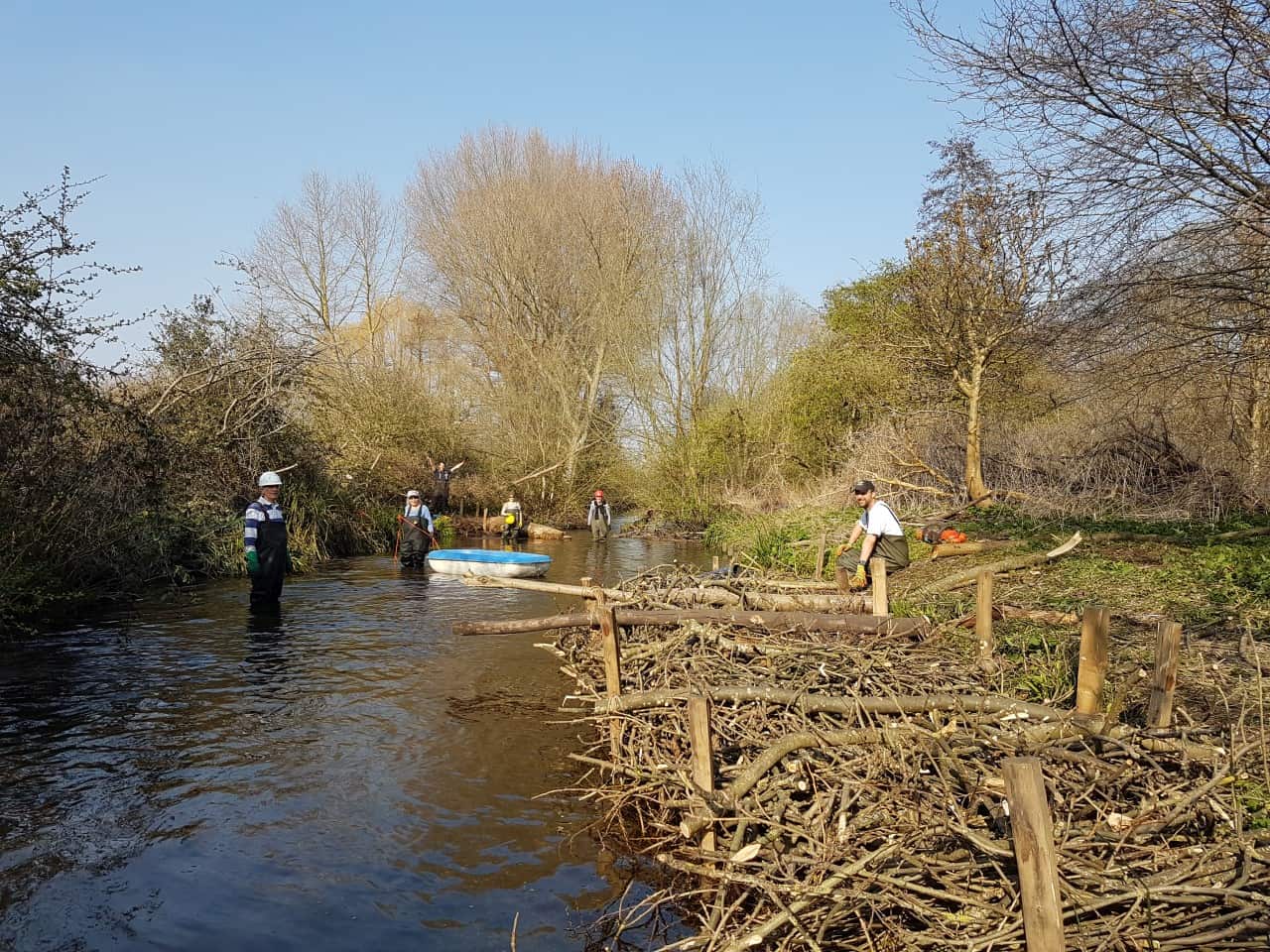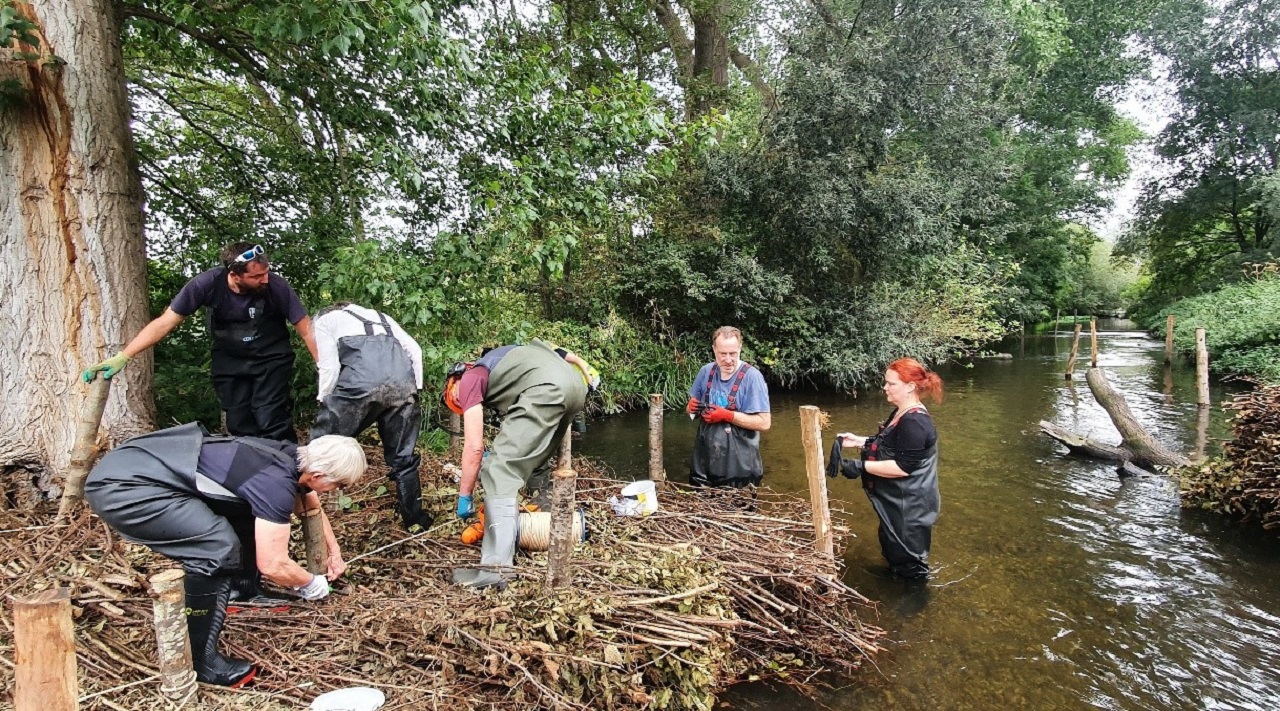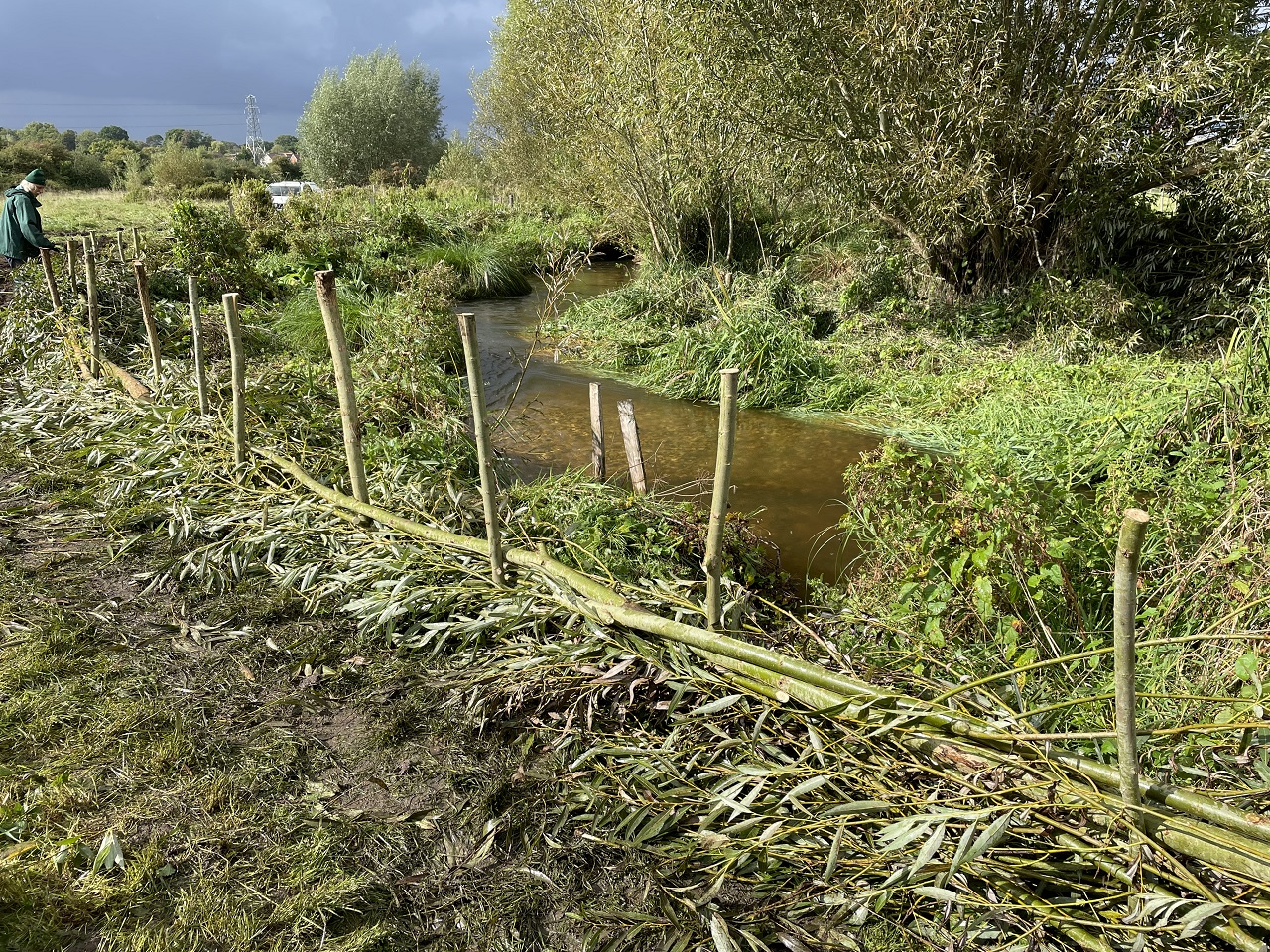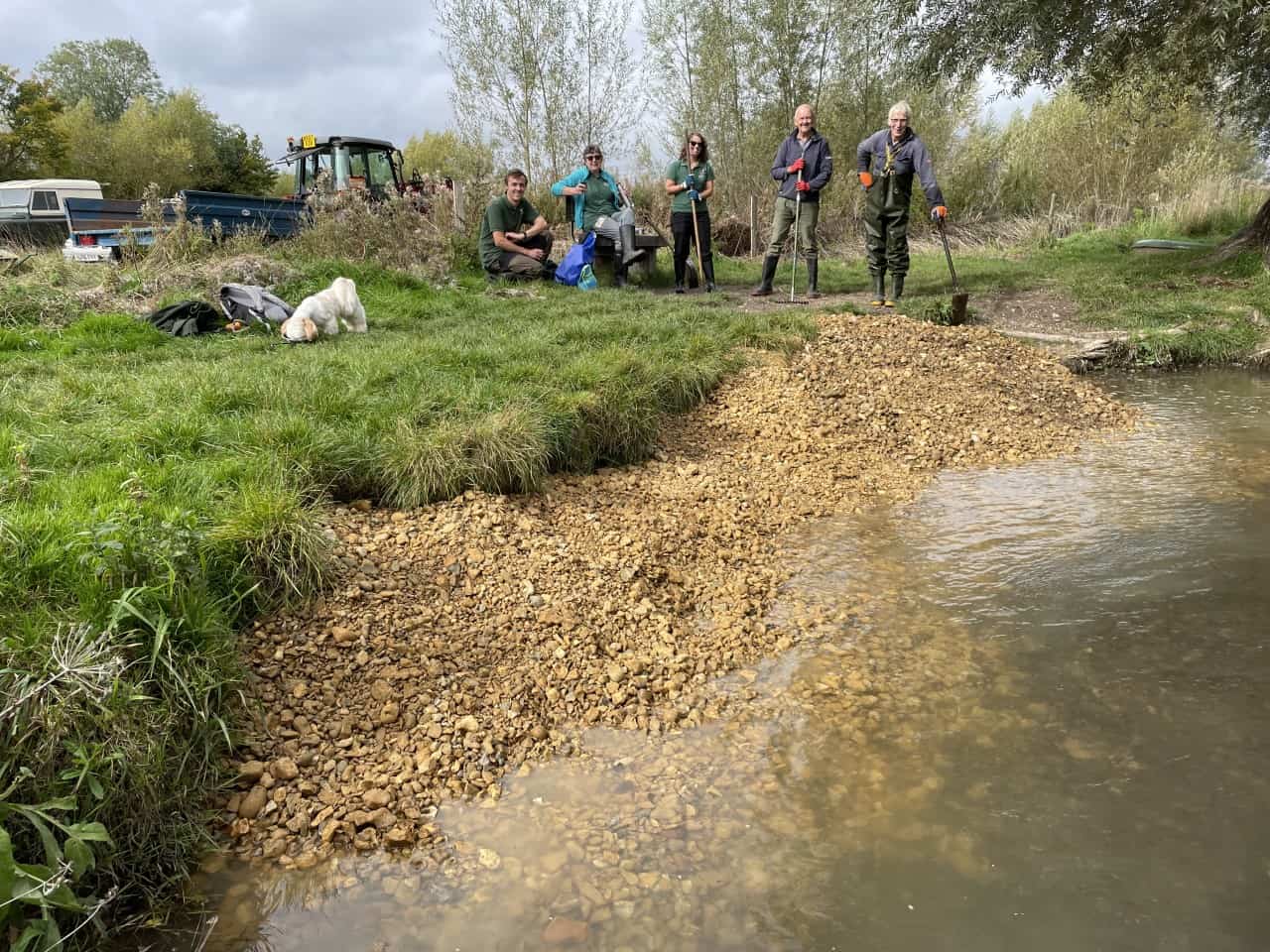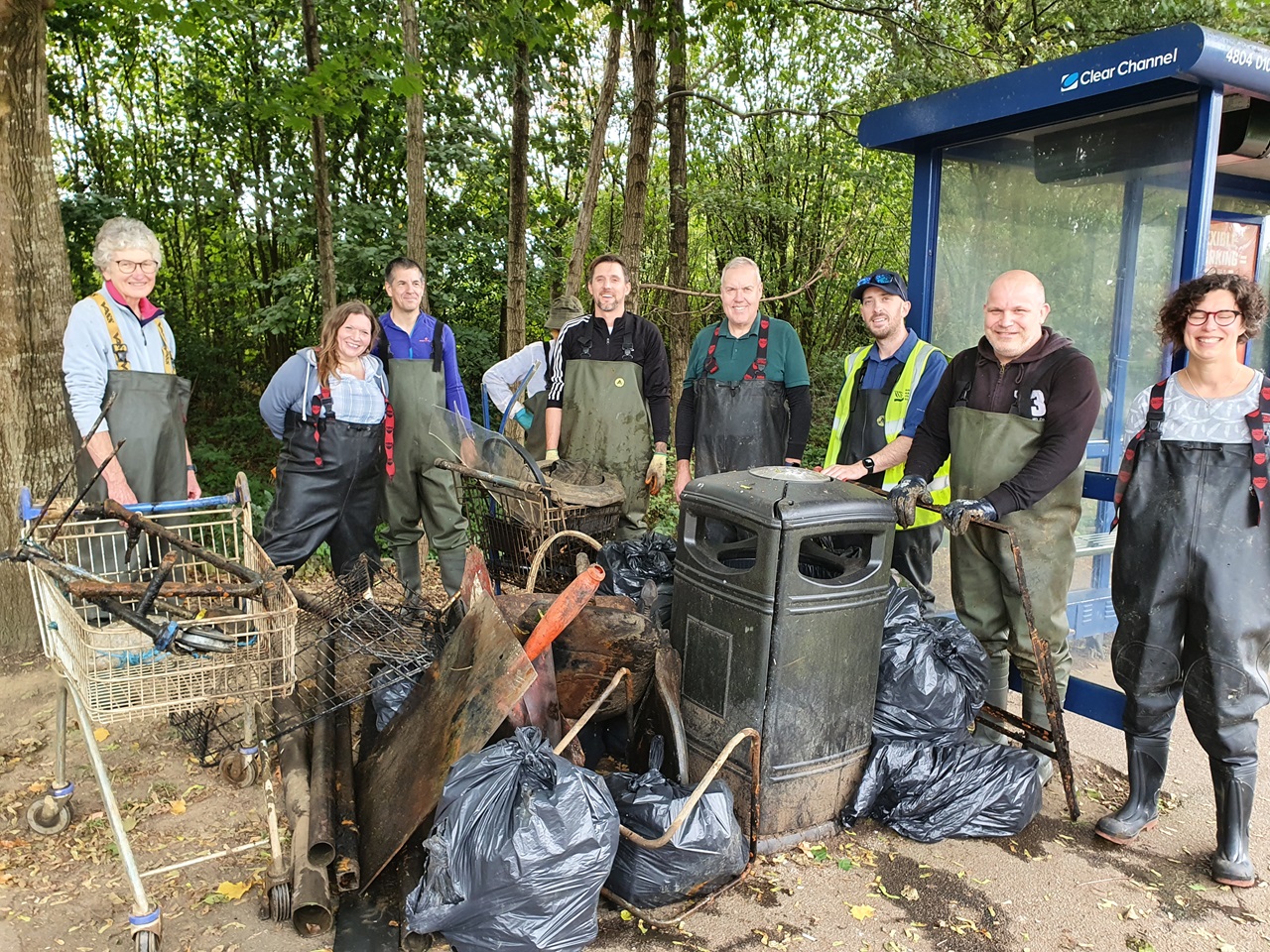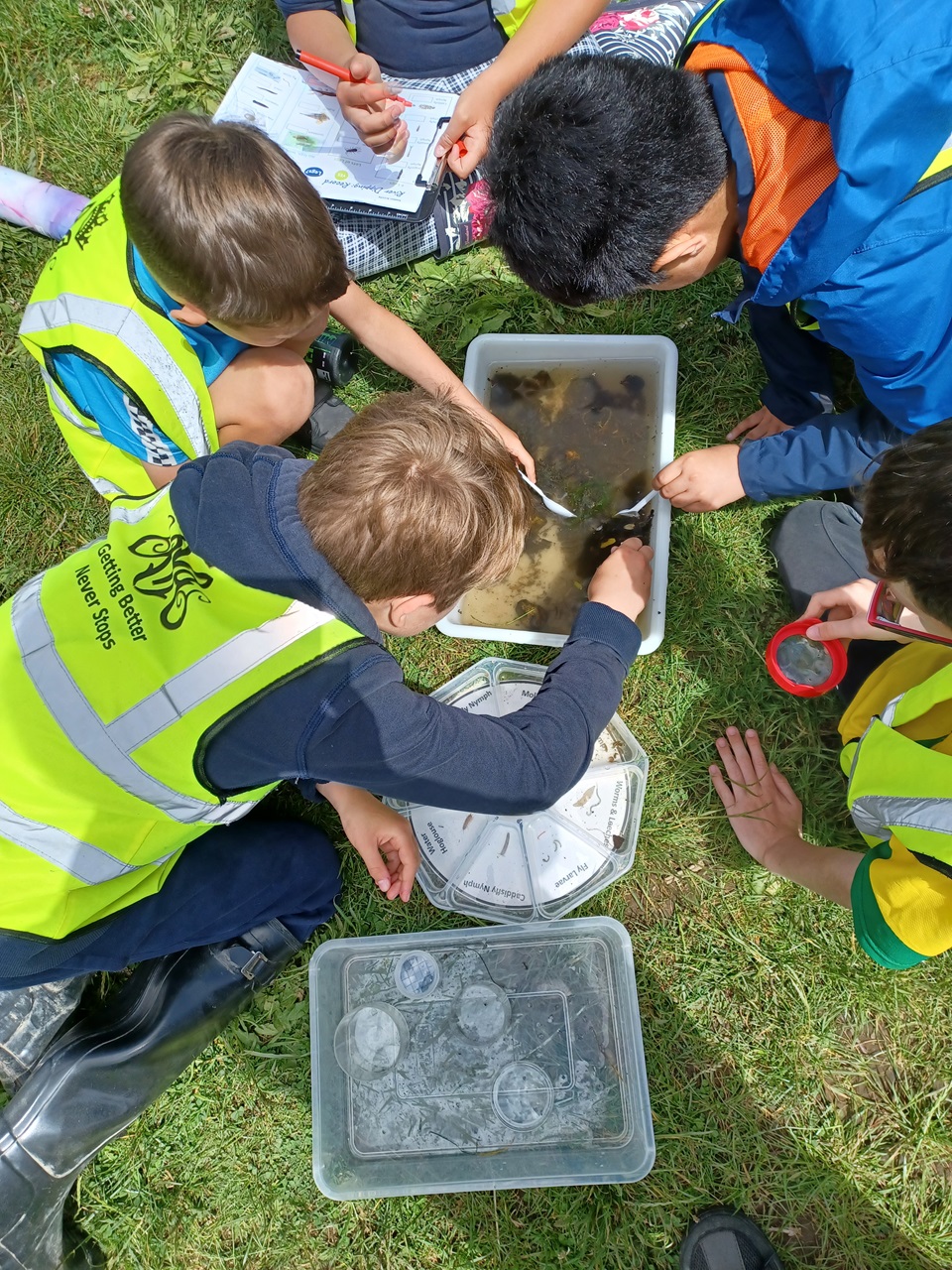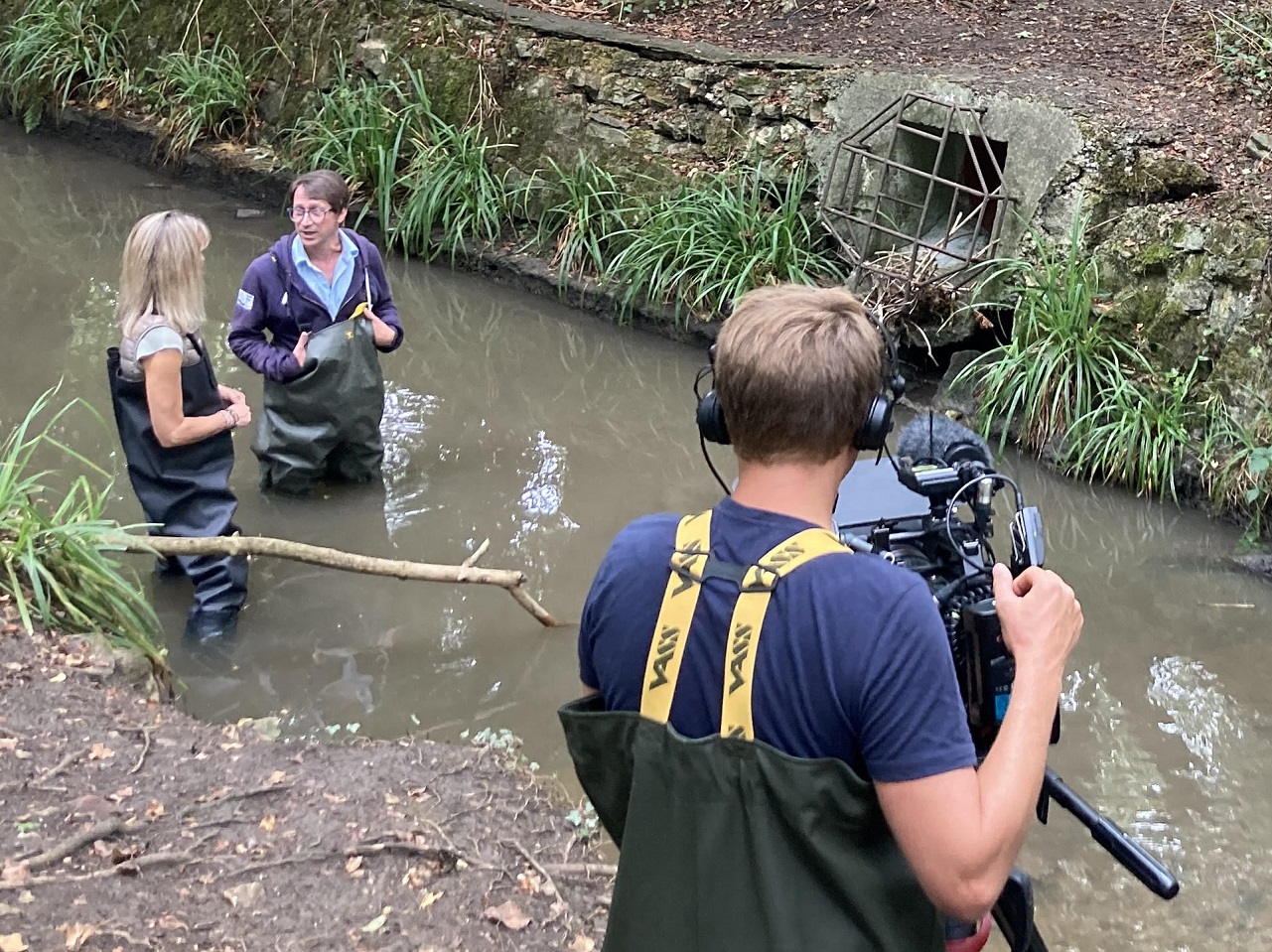Tag: Hogsmill
River restoration at Elmbridge Meadows – Hogsmill River
Works are currently underway to re-naturalise a 1km stretch of the Hogsmill river between the A3 and Rose Walk Nature Reserve.
This project aims to increase habitat diversity to support a wider range of wildlife, it’s a fantastic opportunity to help restore your local river for the benefit of nature!
Join us at the newly restored section to don a pair of waders and help us create more varied river habitat by adding large woody material and narrowing the river channel.
Anyone over 16 years of age is welcome, no previous volunteering or river restoration experience is required and full instruction and supervision will be given on the day.
This is physical work and whilst we will make every effort to provide a selection of different tasks, the work may not be suitable for anyone with back problems or other musculoskeletal injury.
All tools and equipment, inc. steel toe waders and gloves will be provided.
Meeting point: In the greenspace near to the Rose Walk Nature Reserve, just off the roundabout at Elmbridge Avenue, and Raeburn Avenue. Nearest postcode: KT5 8EN. Google map HERE
What to bring: Please wear appropriate clothes and footwear. We will provide refreshments but please bring a bottle of water and a packed lunch.
BOOKING ESSENTIAL – please RSVP using the button below and complete the form to secure your spot.
In the event of poor weather, this activity may need to be rescheduled to spring 2025. We will notify all attendees by phone/email if this occurs.
Booking for this event will close at 5pm on Sunday 1st December.
Minimum age 16 years old, unaccompanied 16 and 17 year old’s will need written parental consent. Please email volunteering@southeastriverstrust.org for more information.
Please email volunteering@southeastriverstrust.org to:
- Find out more information,
- Cancel your space if you can no longer make it,
- Submit parental consent for unaccompanied16 &17 year old’s.
To read our Health and Safety Guidelines for this event please click HERE.
Photos and video footage will be taken at this event and used by the Trust for promotional purposes (including but not limited to printed materials, social media, newsletters and the website) and potentially shared with our external partners and funders. From time to time, external media agencies could also take photos, film or record our events.
The Trust’s lawful basis for processing this is “Legitimate Interests” under the General Data Protection Regulations. As an individual you have rights. If you wish for SERT to stop processing this data for you, please talk to a member of staff or email info@southeastriverstrust.org.
To read our Privacy Policy and see how we use and look after the information you provide when booking your spot at our events please click HERE.
River restoration at Elmbridge Meadows – Hogsmill River
Works are currently underway to re-naturalise a 1km stretch of the Hogsmill river between the A3 and Rose Walk Nature Reserve.
This project aims to increase habitat diversity to support a wider range of wildlife, it’s a fantastic opportunity to help restore your local river for the benefit of nature!
Join us at the newly restored section to don a pair of waders and help us create more varied river habitat by adding large woody material and narrowing the river channel.
Anyone over 16 years of age is welcome, no previous volunteering or river restoration experience is required and full instruction and supervision will be given on the day.
This is physical work and whilst we will make every effort to provide a selection of different tasks, the work may not be suitable for anyone with back problems or other musculoskeletal injury.
All tools and equipment, inc. steel toe waders and gloves will be provided.
Meeting point: In the greenspace near to the Rose Walk Nature Reserve, just off the roundabout at Elmbridge Avenue, and Raeburn Avenue. Nearest postcode: KT5 8EN. Google map HERE
What to bring: Please wear appropriate clothes and footwear. We will provide refreshments but please bring a bottle of water and a packed lunch.
BOOKING ESSENTIAL – please RSVP using the button below and complete the form to secure your spot.
In the event of poor weather, this activity may need to be rescheduled to spring 2025. We will notify all attendees by phone/email if this occurs.
Booking for this event will close at 5pm on Sunday 1st December.
Minimum age 16 years old, unaccompanied 16 and 17 year old’s will need written parental consent. Please email volunteering@southeastriverstrust.org for more information.
Please email volunteering@southeastriverstrust.org to:
- Find out more information,
- Cancel your space if you can no longer make it,
- Submit parental consent for unaccompanied16 &17 year old’s.
To read our Health and Safety Guidelines for this event please click HERE.
Photos and video footage will be taken at this event and used by the Trust for promotional purposes (including but not limited to printed materials, social media, newsletters and the website) and potentially shared with our external partners and funders. From time to time, external media agencies could also take photos, film or record our events.
The Trust’s lawful basis for processing this is “Legitimate Interests” under the General Data Protection Regulations. As an individual you have rights. If you wish for SERT to stop processing this data for you, please talk to a member of staff or email info@southeastriverstrust.org.
To read our Privacy Policy and see how we use and look after the information you provide when booking your spot at our events please click HERE.
River restoration at Elmbridge Meadows – Hogsmill River
Works are currently underway to re-naturalise a 1km stretch of the Hogsmill river between the A3 and Rose Walk Nature Reserve.
This project aims to increase habitat diversity to support a wider range of wildlife, it’s a fantastic opportunity to help restore your local river for the benefit of nature!
Join us at the newly restored section to don a pair of waders and help us create more varied river habitat by adding large woody material and narrowing the river channel.
Anyone over 16 years of age is welcome, no previous volunteering or river restoration experience is required and full instruction and supervision will be given on the day.
This is physical work and whilst we will make every effort to provide a selection of different tasks, the work may not be suitable for anyone with back problems or other musculoskeletal injury.
All tools and equipment, inc. steel toe waders and gloves will be provided.
Meeting point: In the greenspace near to the Rose Walk Nature Reserve, just off the roundabout at Elmbridge Avenue, and Raeburn Avenue. Nearest postcode: KT5 8EN. Google map HERE
What to bring: Please wear appropriate clothes and footwear. We will provide refreshments but please bring a bottle of water and a packed lunch.
BOOKING ESSENTIAL – please RSVP using the button below and complete the form to secure your spot.
In the event of poor weather, this activity may need to be rescheduled to spring 2025. We will notify all attendees by phone/email if this occurs.
Booking for this event will close at 5pm on Sunday 1st December.
Minimum age 16 years old, unaccompanied 16 and 17 year old’s will need written parental consent. Please email volunteering@southeastriverstrust.org for more information.
Please email volunteering@southeastriverstrust.org to:
- Find out more information,
- Cancel your space if you can no longer make it,
- Submit parental consent for unaccompanied16 &17 year old’s.
To read our Health and Safety Guidelines for this event please click HERE.
Photos and video footage will be taken at this event and used by the Trust for promotional purposes (including but not limited to printed materials, social media, newsletters and the website) and potentially shared with our external partners and funders. From time to time, external media agencies could also take photos, film or record our events.
The Trust’s lawful basis for processing this is “Legitimate Interests” under the General Data Protection Regulations. As an individual you have rights. If you wish for SERT to stop processing this data for you, please talk to a member of staff or email info@southeastriverstrust.org.
To read our Privacy Policy and see how we use and look after the information you provide when booking your spot at our events please click HERE.
Elmbridge Meadows dead hedging- Hogsmill River
Join us at the newly restored section of the Hogsmill river in Elmbridge Meadows to erect a dead hedge.
Works are currently underway to re-naturalise a 1km stretch of the river between the A3 and Rose Walk Nature Reserve.
Once work is complete, the hedge will provide an important barrier, to protect the restored sections of river and allow the new habitat to establish and thrive.
Dogs love using the river to swim and play, and this has been an important consideration throughout the design of the Enriching Elmbridge Meadows project. We are creating two ‘doggy dips’ which are sloping, reinforced sections of bank where dogs can enter the water. By directing dogs towards these areas, and restricting access to others, we can protect the important habitat works and also provide safe entry and exit for dogs to continue using the water.
Meeting point: In the greenspace near to the Rose Walk Nature Reserve, just off the roundabout at Elmbridge Avenue, and Raeburn Avenue. Nearest postcode: KT5 8EN. Google map HERE
What to bring: Please wear appropriate clothes and footwear. We will provide refreshments but please bring a bottle of water and a packed lunch.
Booking: please rsvp using the button below and complete the form to secure your spot. If the event is already fully booked then please sign yourself up to the waiting list and we’ll be in touch if a space becomes available.
Booking for this event will close at 5pm on Monday 18th November.
Under 16’s will need to be accompanied by an adult, unaccompanied 16 and 17 year old’s will need written parental consent. Please email volunteering@southeastriverstrust.org for more information.
Please email volunteering@southeastriverstrust.org to:
- Find out more information,
- Submit parental consent for unaccompanied 16 and 17 year old’s.
- Cancel your space if you can no longer make it.
To read our Health and Safety Guidelines for this event please click HERE.
Photos and video footage will be taken at this event and used by the Trust for promotional purposes (including but not limited to printed materials, social media, newsletters and the website) and potentially shared with our external partners and funders. From time to time, external media agencies could also take photos, film or record our events.
The Trust’s lawful basis for processing this is “Legitimate Interests” under the General Data Protection Regulations. As an individual you have rights. If you wish for SERT to stop processing this data for you, please talk to a member of staff or email info@southeastriverstrust.org.
To read our Privacy Policy and see how we use and look after the information you provide when booking your spot at our events please click HERE.
Elmbridge Meadows dead hedging- Hogsmill River
Join us at the newly restored section of the Hogsmill river in Elmbridge Meadows to erect a dead hedge.
Works are currently underway to re-naturalise a 1km stretch of the river between the A3 and Rose Walk Nature Reserve.
Once work is complete, the hedge will provide an important barrier, to protect the restored sections of river and allow the new habitat to establish and thrive.
Dogs love using the river to swim and play, and this has been an important consideration throughout the design of the Enriching Elmbridge Meadows project. We are creating two ‘doggy dips’ which are sloping, reinforced sections of bank where dogs can enter the water. By directing dogs towards these areas, and restricting access to others, we can protect the important habitat works and also provide safe entry and exit for dogs to continue using the water.
Meeting point: In the greenspace near to the Rose Walk Nature Reserve, just off the roundabout at Elmbridge Avenue, and Raeburn Avenue. Nearest postcode: KT5 8EN. Google map HERE
What to bring: Please wear appropriate clothes and footwear. We will provide refreshments but please bring a bottle of water and a packed lunch.
Booking: please rsvp using the button below and complete the form to secure your spot. If the event is already fully booked then please sign yourself up to the waiting list and we’ll be in touch if a space becomes available.
Booking for this event will close at 5pm on Sunday 17th November.
Under 16’s will need to be accompanied by an adult, unaccompanied 16 and 17 year old’s will need written parental consent. Please email volunteering@southeastriverstrust.org for more information.
Please email volunteering@southeastriverstrust.org to:
- Find out more information,
- Submit parental consent for unaccompanied 16 and 17 year old’s.
- Cancel your space if you can no longer make it.
To read our Health and Safety Guidelines for this event please click HERE.
Photos and video footage will be taken at this event and used by the Trust for promotional purposes (including but not limited to printed materials, social media, newsletters and the website) and potentially shared with our external partners and funders. From time to time, external media agencies could also take photos, film or record our events.
The Trust’s lawful basis for processing this is “Legitimate Interests” under the General Data Protection Regulations. As an individual you have rights. If you wish for SERT to stop processing this data for you, please talk to a member of staff or email info@southeastriverstrust.org.
To read our Privacy Policy and see how we use and look after the information you provide when booking your spot at our events please click HERE.
Gravel Seeding – Hogsmill River
We need your help to introduce gravels to the Hogsmill river.
The new gravel will create riverbed features, such as pools and riffles, providing improved habitat for aquatic species. This habitat is essential for aquatic plants, invertebrates and fish as it offers refuge and spawning areas.
The bulk of this work will be using rakes to move gravel across the riverbed, there may also be some shoveling and wheelbarrowing.
This is a fantastic opportunity to help restore your local river for the benefit of nature!
Please be aware that this is a very physical activity, working in the river in waders. This activity may not be suitable for anyone with back pain or other musculoskeletal injury.
All tools and equipment, inc. steel toe waders and gloves will be provided.
Meeting Point:
The gravel seeding is taking place at multiple locations along the first 2.5km of the river from where it rises in Ewell. The exact meeting point will be confirmed by email a few days before the event and will be dependent on progress of works on the preceding days.
What to Bring:
– We will provide tea, coffee and biscuits but please bring your own lunch and plenty of water.
– Appropriate outdoor clothing, extra layers and waterproofs
BOOKING ESSENTIAL – please RSVP using the button below and complete the form to secure your spot.
Booking for this event will close at 5pm on Thursday 29th August.
Minimum age 16 years old. 16 and 17 year old’s will need parental consent to attend, please email volunteering@southeastriverstrust.org for more information.
Please email volunteering@southeastriverstrust.org to:
- Find out more information,
- Cancel your space if you can no longer make it.
To read our Health and Safety Guidelines for this event please click HERE.
Photos and video footage will be taken at this event and used by the Trust for promotional purposes (including but not limited to printed materials, social media, newsletters and the website) and potentially shared with our external partners and funders. From time to time, external media agencies could also take photos, film or record our events.
The Trust’s lawful basis for processing this is “Legitimate Interests” under the General Data Protection Regulations. As an individual you have rights. If you wish for SERT to stop processing this data for you, please talk to a member of staff or email info@southeastriverstrust.org.
To read our Privacy Policy and see how we use and look after the information you provide when booking your spot at our events please click HERE.
Gravel Seeding, afternoon session- Hogsmill River
We need your help to introduce gravels to the Hogsmill river.
The new gravel will create riverbed features, such as pools and riffles, providing improved habitat for aquatic species. This habitat is essential for aquatic plants, invertebrates and fish as it offers refuge and spawning areas.
The bulk of this work will be using rakes to move gravel across the riverbed, there may also be some shoveling and wheelbarrowing.
Please be aware that this is a very physical activity, working in the river in waders, and may not be suitable for anyone with back pain or other musculoskeletal injury.
This is a fantastic opportunity to help restore your local river for the benefit of nature!
All tools and equipment, inc. steel toe waders and gloves will be provided.
Meeting Point:
The gravel seeding is taking place at multiple locations along the first 2.5km of the river from where it rises in Ewell. The exact meeting point will be confirmed by email a few days before the event and will be dependent on progress of works on the preceding days.
What to Bring:
– We will provide tea, coffee and biscuits but please bring your own lunch and plenty of water.
– Appropriate outdoor clothing, extra layers and waterproofs
BOOKING ESSENTIAL – please RSVP using the button below and complete the form to secure your spot.
Booking for this event will close at 5pm on Thursday 29th August.
Minimum age 16 years old. 16 and 17 year old’s will need parental consent to attend, please email volunteering@southeastriverstrust.org for more information.
Please email volunteering@southeastriverstrust.org to:
- Find out more information,
- Cancel your space if you can no longer make it.
To read our Health and Safety Guidelines for this event please click HERE.
Photos and video footage will be taken at this event and used by the Trust for promotional purposes (including but not limited to printed materials, social media, newsletters and the website) and potentially shared with our external partners and funders. From time to time, external media agencies could also take photos, film or record our events.
The Trust’s lawful basis for processing this is “Legitimate Interests” under the General Data Protection Regulations. As an individual you have rights. If you wish for SERT to stop processing this data for you, please talk to a member of staff or email info@southeastriverstrust.org.
To read our Privacy Policy and see how we use and look after the information you provide when booking your spot at our events please click HERE.
Gravel Seeding, morning session – Hogsmill River
We need your help to introduce gravels to the Hogsmill river.
The new gravel will create riverbed features, such as pools and riffles, providing improved habitat for aquatic species. This habitat is essential for aquatic plants, invertebrates and fish as it offers refuge and spawning areas.
The bulk of this work will be using rakes to move gravel across the riverbed, there may also be some shoveling and wheelbarrowing.
Please be aware that this is a very physical activity, working in the river in waders, and may not be suitable for anyone with back pain or other musculoskeletal injury.
This is a fantastic opportunity to help restore your local river for the benefit of nature!
All tools and equipment, inc. steel toe waders and gloves will be provided.
Meeting Point:
The gravel seeding is taking place at multiple locations along the first 2.5km of the river from where it rises in Ewell. The exact meeting point will be confirmed by email a few days before the event and will be dependent on progress of works on the preceding days.
What to Bring:
– We will provide tea, coffee and biscuits but please bring your own lunch and plenty of water.
– Appropriate outdoor clothing, extra layers and waterproofs
BOOKING ESSENTIAL – please RSVP using the button below and complete the form to secure your spot.
Booking for this event will close at 5pm on Thursday 29th August.
Minimum age 16 years old. 16 and 17 year old’s will need parental consent to attend, please email volunteering@southeastriverstrust.org for more information.
Please email volunteering@southeastriverstrust.org to:
- Find out more information,
- Cancel your space if you can no longer make it.
To read our Health and Safety Guidelines for this event please click HERE.
Photos and video footage will be taken at this event and used by the Trust for promotional purposes (including but not limited to printed materials, social media, newsletters and the website) and potentially shared with our external partners and funders. From time to time, external media agencies could also take photos, film or record our events.
The Trust’s lawful basis for processing this is “Legitimate Interests” under the General Data Protection Regulations. As an individual you have rights. If you wish for SERT to stop processing this data for you, please talk to a member of staff or email info@southeastriverstrust.org.
To read our Privacy Policy and see how we use and look after the information you provide when booking your spot at our events please click HERE.
Cancelled: Family Friendly Guided Walk, Elmbridge Meadows – Hogsmill River
Join us for a free, family friendly walk to learn about the Hogsmill River and become a Junior River Ranger!
This interactive walk is part of a river restoration project to transform a 1km stretch of the Hogsmill as it flows through Elmbridge Meadows.
This event is suitable for 5-12 year old’s, accompanied by an adult.
Booking is essential, please only book a space for the children attending.
Please wear appropriate clothing and footwear.
Please note, there are no toilets on site.
Photos and video footage will be taken at this event and used by the Trust for promotional purposes (including but not limited to printed materials, social media, newsletters and the website) and potentially shared with our external partners and funders. From time to time, external media agencies could also take photos, film or record our events.
The Trust’s lawful basis for processing this is “Legitimate Interests” under the General Data Protection Regulations. As an individual you have rights. If you wish for SERT to stop processing this data for you, please talk to a member of staff or email info@southeastriverstrust.org.
To read our Privacy Policy and see how we use and look after the information you provide when booking your spot at our events please click HERE.
Family Friendly Guided Walk, Elmbridge Meadows – Hogsmill River
Join us for a free, family friendly walk to learn about the Hogsmill River and become a Junior River Ranger!
This interactive walk is part of a river restoration project to transform a 1km stretch of the Hogsmill as it flows through Elmbridge Meadows.
This event is suitable for 5-12 year old’s, accompanied by an adult.
Booking is essential, please only book a space for the children attending.
Please wear appropriate clothing and footwear.
Please note, there are no toilets on site.
Photos and video footage will be taken at this event and used by the Trust for promotional purposes (including but not limited to printed materials, social media, newsletters and the website) and potentially shared with our external partners and funders. From time to time, external media agencies could also take photos, film or record our events.
The Trust’s lawful basis for processing this is “Legitimate Interests” under the General Data Protection Regulations. As an individual you have rights. If you wish for SERT to stop processing this data for you, please talk to a member of staff or email info@southeastriverstrust.org.
To read our Privacy Policy and see how we use and look after the information you provide when booking your spot at our events please click HERE.
Elmbridge Meadows Community Day – Hogsmill River
Join us on Thursday 29th August for a day of river-themed family fun!
Come and learn more about the Elmbridge Meadows river restoration project at the SERT information stall or take part in one of our activities which include a river cleanup, kids crafts and a river dipping table.
Our stall will be set up at the entrance to Elmbridge Meadows, just off the roundabout at Elmbridge Avenue, and Raeburn Avenue. Nearest postcode: KT5 8EN. Google map HERE
The river cleanup activity will begin at 12:30pm, finishing at 2:45pm. Some spaces will be available on the day but you can also book your space via our separate event listing HERE.
The river cleanup activity can be done from the banks or in the water, wearing waders. The activity will be supervised by SERT staff and we will provide all the equipment you will need. The activity is suitable for under 16s if they are accompanied by an adult. 16-18 year old’s will need to be accompanied or have written parental consent to take part (please email volunteering@southeastriverstrust.org for more info). No under 14s will be able to enter the water.
To read our Health and Safety Guidelines for the river cleanup that will take place during the open day, please click HERE.
There is no need to book for any of the other activities, just come along on the day.
Please note that there are no toilets on site.
Photos and video footage will be taken at this event and used by the Trust for promotional purposes (including but not limited to printed materials, social media, newsletters and the website) and potentially shared with our external partners and funders. From time to time, external media agencies could also take photos, film or record our events.
The Trust’s lawful basis for processing this is “Legitimate Interests” under the General Data Protection Regulations. As an individual you have rights. If you wish for SERT to stop processing this data for you, please talk to a member of staff or email info@southeastriverstrust.org.
To read our Privacy Policy and see how we use and look after the information you provide when booking your spot at our events please click HERE.
River Cleanup at Elmbridge Meadows Community Day – Hogsmill River
Activity Description: As part of the Elmbridge Meadows Community Day, take part in a river cleanup to remove litter from the river and banks.
Rubbish in our rivers is a big problem. Not only is it unsightly, it also has a huge environmental impact; harming wildlife and leaking chemicals and pollutants into the water. If it’s not picked up, it often makes its way into our oceans where it is estimated it will persist for hundreds of years, damaging marine ecosystems and even ending up in our food chain as micro-plastics.
The river cleanup activity can be done from the banks or in the water, wearing waders. The activity will be supervised by SERT staff and we will provide all the equipment you will need. The activity is suitable for under 16s if they are accompanied by an adult. 16-18 year old’s will need to be accompanied or have written parental consent to take part (please email volunteering@southeastriverstrust.org for more info). No under 14s will be able to enter the water.
Meeting point: The SERT Information Stall at Elmbridge Meadows, near to the Rose Walk Nature Reserve, just off the roundabout at Elmbridge Avenue, and Raeburn Avenue. Nearest postcode: KT5 8EN. Google map HERE
What to bring: Please wear appropriate clothes and footwear. If it is hot, please bring a hat and sun cream. There will be options to work from the bank or in the water in waders. We will provide refreshments but please bring a bottle of water.
Booking: please rsvp using the button below and complete the form to secure your spot. If the event is already fully booked then please sign yourself up to the waiting list and we’ll be in touch if a space becomes available. There will also be some spaces available on the day.
Booking for this event will close at 5pm on Tuesday 27th August.
Please email volunteering@southeastriverstrust.org to:
- Find out more information,
- Cancel your space if you can no longer make it.
To read our Health and Safety Guidelines for this event please click HERE.
Photos and video footage will be taken at this event and used by the Trust for promotional purposes (including but not limited to printed materials, social media, newsletters and the website) and potentially shared with our external partners and funders. From time to time, external media agencies could also take photos, film or record our events.
The Trust’s lawful basis for processing this is “Legitimate Interests” under the General Data Protection Regulations. As an individual you have rights. If you wish for SERT to stop processing this data for you, please talk to a member of staff or email info@southeastriverstrust.org.
To read our Privacy Policy and see how we use and look after the information you provide when booking your spot at our events please click HERE.
Protected: BNYMellon Corporate Day
London Rivers Week 2024
Last week, we celebrated London Rivers Week by hosting four local events on our South London rivers, with 90 volunteers joining us to make a positive impact.
What is London Rivers Week?
London Rivers Week is an annual campaign that inspires the public to celebrate all of London’s rivers and the various projects that protect them. This year’s theme, “London is a River City,” focused on health, well-being, and cultural activities. Now in its eighth year, London Rivers Week continues to grow, uniting partners and communities to celebrate the abundance of rivers and waterways in London.
Cleaning up the Wandle

Volunteers from near and far joined us to clean up the River Wandle in Poulter Park. Their fantastic efforts resulted in the removal of a significant amount of rubbish, including tyres, a push bike, pots and pans, a huge sign, a few shoes, and some very gross cushions. A big thank you to Sutton Council for arranging rubbish removal and to Tooting and Mitcham Community Sports Club for letting us use their facilities!
Showcasing restoration on the Beverley Brook
We gave a tour along the Beverley Brook from Richmond Park to Wimbledon Common (and back again!) to learn about the history, ecology and river restoration work of the Beverley Brook. In 2015, we partnered with The Royal Parks to rehabilitate over 600m of the Beverley Brook through Richmond Park and improve the water quality of the river by implementing both engineered and nature-based solutions. This is one of our flagship projects and we love sharing it with the community and local partners – you can read more about it here!

Family Fun At Elmbridge Meadows Community Day
A fun-filled family day was the perfect opportunity for residents to find out how our Enriching Elmbridge Meadows project will re-naturalise 1km of the Hogsmill River. Our information stall gave more information on the river and the project, children enjoyed our craft activities and a small group got into the river in the afternoon to pull up the invasive plant, Himalayan Balsam. Some of our wonderful riverfly volunteers, who carry out monthly monitoring of river invertebrates, kindly gave their time to help collect river dipping samples and people of all ages took delight in seeing what actually lives in the river.
Bashing balsam on the Hogsmill Chalk Stream
We had an amazing turnout for a balsam bash on the Hogsmill with local volunteers joined by the Kingston Ramblers.

Himalayan balsam is a big problem for river banks up and down the country. In addition to competition for pollinators, native plants must also compete for light, nutrients and space, leading to an overall reduction in native biodiversity. Moreover, the fact that the balsam dies back in the winter means that it leaves river banks bare and susceptible to erosion, and the dead leaves and stems can also cause blockages, which can lead to flooding.
What’s more, each plant can produce up to 800 seeds per year – and one plant can propel copious amounts of that seed a distance of up to seven metres!
We’re working with local partners to tackle balsam on the Hogsmill, planning events to eradicate the upstream source first and work downstream. We have also trialed biological control as part of the wider Enriching Elmbridge Meadows Project.
London Rivers Week is organised for the River Partnerships in London (RiPL) via the London Rivers Week steering group. The principal organisations running London Rivers Week are the Environment Agency, Thames21, the South East Rivers Trust, London Wildlife Trust, ZSL, CPRE London, and the Thames Estuary Partnership. In addition to these organisations, many other groups run and contribute to events, walks, talks and seminars to demonstrate the value of rivers.
Another great year for the event, and we look forward to London Rivers Week 2025!
New Chamber Mead wetlands brings fresh hope for Hogsmill
The South East Rivers Trust (SERT) has completed the construction of a 2,000m2 pollution filter which will bring major benefits to the Hogsmill chalk stream.
When planting takes place in the spring, the newly constructed Chamber Mead wetland will protect and improve 5km of river downstream, filtering pollutants and becoming a haven for wildlife.
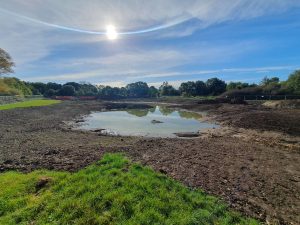
The project has been carried out in partnership with Epsom & Ewell Borough Council, which owns and manages the Hogsmill Local Nature Reserve, a popular greenspace which will now benefit from this new community asset.
The wetland is a crucial project for the Hogsmill, which suffers adversely from pollution such as urban road runoff, raw sewage discharges and misconnected plumbing that sends drain water directly into the river.
Water from the Green Lanes Stream has been diverted through a sediment trap and two wetlands. Filtered, cleaner water is then reconnected to the Hogsmill downstream of the famous Stepping Stones.
News about the wetland’s completion comes in the week of World Wetlands Day, on Friday 2nd February.
Dr Bella Davies, Co-CEO of SERT, said: “We are delighted that the construction phase of this important wetlands project has now been completed. It is destined to become a jewel in the crown of the Hogsmill Local Nature Reserve. The public has shown great enthusiasm for this project, and we will soon be calling on volunteers and community groups to add the plants that will really make the wetlands flourish as a magnet for wildlife. The water quality improvements that will result from the wetlands are designed to help the river become a healthier place for all, especially wildlife that thrive in a chalk stream, such as brown trout.”
Councillor John Beckett, Chair of the Environment Committee at Epsom & Ewell Borough Council, said: “The council is committed to protecting and enhancing biodiversity in our borough, as per our Biodiversity Action Plan 2020-30. This partnership project with the South East Rivers Trust will help to ensure that the Hogsmill Local Nature Reserve is a place where nature can thrive; from woodpeckers, hedgehogs and bats – to species whose numbers have dwindled such as water voles, fish and eels. We know our residents cherish this Local Nature Reserve and I hope that many can join the community planting days, which are a unique opportunity to be part of this fantastic project.”
Michele Cooper, Environment Agency Catchment Coordinator, added: “In partnership with local communities, the Environment Agency is investing millions in chalk stream restoration projects across the country to foster more sustainable abstraction, tackle pollution from agriculture and the sewage system, and restore more natural processes.
“Chalk streams are precious habitats, havens for wildlife and highly valued by local communities and visitors alike. Together with our partners, we also continue to work hard to protect and enhance wetland habitats to benefit people and nature. Their future depends on collective action and this partnership project is therefore a much needed and welcome step towards addressing the many pressures these rare watercourses face.”
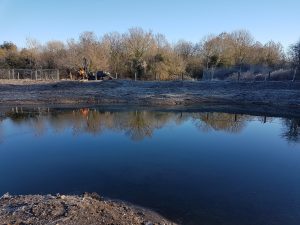
SERT is now preparing a series of community planting days, to take place in the Spring. These will give residents the chance to plant the vegetation to help the wetlands counter pollutants.
Schools, community groups and residents will be given opportunities to install plants that have been specifically selected to filter pollution, trap sediments and attract a variety of wildlife. Plants selected include yellow flag iris, ragged robin, purple loosestrife and brooklime.
In time, SERT will also offer guided walks and outdoor education sessions for school children. A nature trail is planned for families to interact with the wetlands as they develop, alongside information boards which will detail the reasons why the wetlands were needed and the types of wildlife that should be attracted.
The construction was carried out with Five Rivers environmental specialists.
Supported by the Hogsmill Catchment Partnership, the project has received funding from The Coca-Cola Foundation, Natural England (through the Species Recovery Programme), the Environment Agency, Surrey County Council, the Rivers Trust, the Zoological Society of London, Garfield Weston Foundation and Thames Water, with in-kind support from the landowner Epsom & Ewell Borough Council. The new wetlands are part of the wider Replenish programme in partnership with the Coca-Cola Foundation and the Rivers Trust. The aim of Replenish is to restore millions of litres of water in this and other local catchments, in turn improving biodiversity.
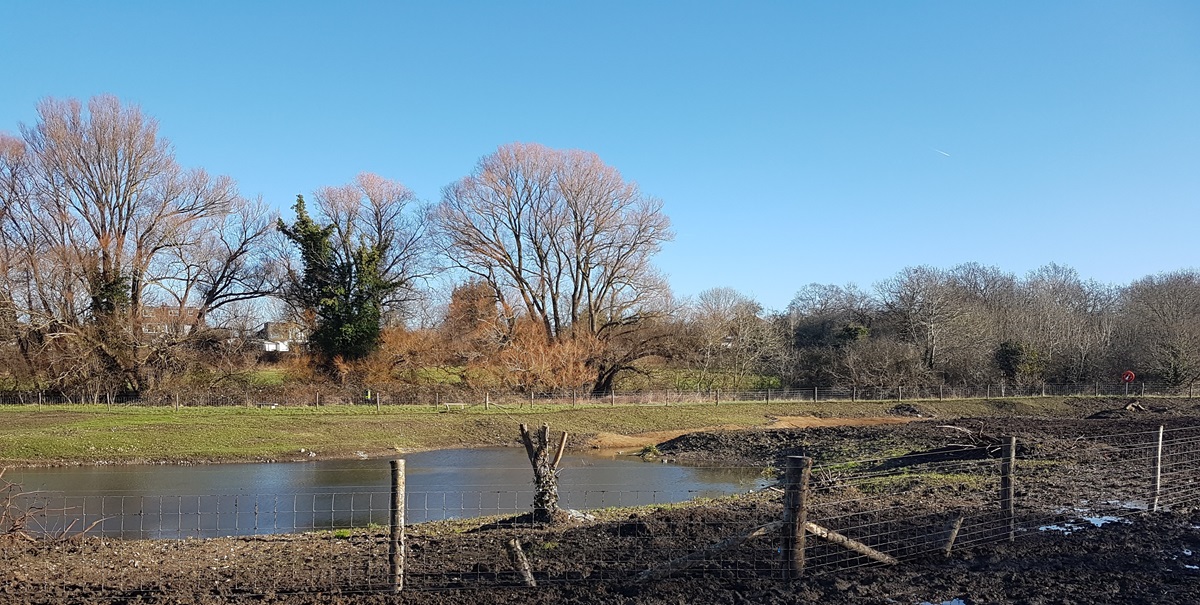
Cast your vote at Tesco to help us educate children on the Mole
Shoppers at selected Tesco stores in Horley and Dorking can vote to support the South East Rivers Trust’s (SERT) programme to connect local children with the River Mole and its wildlife.
SERT’s school sessions bring children to their local river to spend time in nature and learn about the local wildlife – all while meeting the school’s needs for the curriculum.
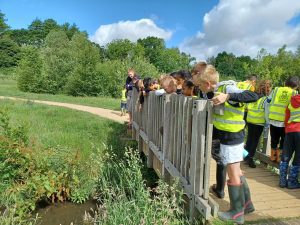
Studies show that children who are connected to nature are happier, healthier and more motivated to learn – and feedback on our sessions shows the power of outdoor education.
One teacher said: “The session was a fantastic way to introduce the children to our rivers topic, the delivery and the content was engaging and the children had an absolute blast!”
A pupil added: “I loved making a promise to make sure that the river will keep flowing and not dry up!”
Polly Penn, Head of Working with Communities at the South East Rivers Trust, said: “We are delighted to have been chosen as a Tesco Stronger Starts community project because we know from our education sessions that children love the chance to visit the river. They are always inspired by being able to see for themselves the creatures they have learned about in the classroom.
“Our aim is that this and our lessons about how to use water wisely in their daily lives will instil lifelong habits – and might even inspire some of them to become scientists in the future. We hope shoppers will take this opportunity to support our work.”
Customer votes will decide how three chosen charities will receive awards of £500, £1,000 or £1,500.
The three stores where customers can vote for SERT, between mid-January and the end of March 2024, are:
- Tesco Gatwick Extra, Reigate Road, Horley RH6 0AT
- Tesco Express, Brighton Road, Horley RH6 7HL
- Tesco Express, Reigate Road, Dorking RH4 1QB
Tesco’s Stronger Starts – previously known as Tesco Community Grants – has already provided more than £110 million to 60,000 projects across Britain.
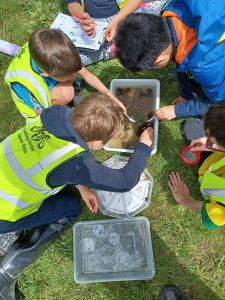
This £5m Stronger Starts grant programme, delivered in partnership with Groundwork UK, helps schools and children’s groups provide nutritious food and healthy activities that support young people’s physical health and mental wellbeing, such as breakfast clubs or snacks, and sports equipment for after school clubs.
Claire de Silva, Tesco UK Head of Communities and Local Media, said: “Helping schools and children’s groups access the food and resources they need is vitally important in getting children a stronger start in life. Children with enough food have more energy, better concentration, and ultimately achieve more too.”
Graham Duxbury, Groundwork’s UK Chief Executive, said: “As a community charity, we have seen first-hand how schools and other groups supporting young people have been playing a much bigger role in ensuring children are getting a healthy start to the day and getting access to spaces and services to support physical activity and mental health. Family budgets are tight and school budgets are tight, but it’s so important that children stay fed, fit and focused, so we’re delighted to be able to prioritise these activities alongside Tesco with the Stronger Starts programme.”
Funding is available to community groups and charities looking to fund local projects that bring benefits to communities, particularly those helping to provide food and giving children the support they need for a good start in life.
- For full details of SERT’s education opportunities for schools and youth groups and to book, visit our education page.
- To gain an insight into one aspect of our education sessions, read our blog Promise sticks and sit spots – an education outlook.
Three actions to take after watching Swimming in Sewage
At the start of October, the South East Rivers Trust appeared on Channel 5’s documentary about sewage in our rivers. The programme demonstrated the extent of the problem nationwide, quoting swimmers and environmental campaigners. Below is a snippet of our involvement in highlighting the issues – and three actions you can take.
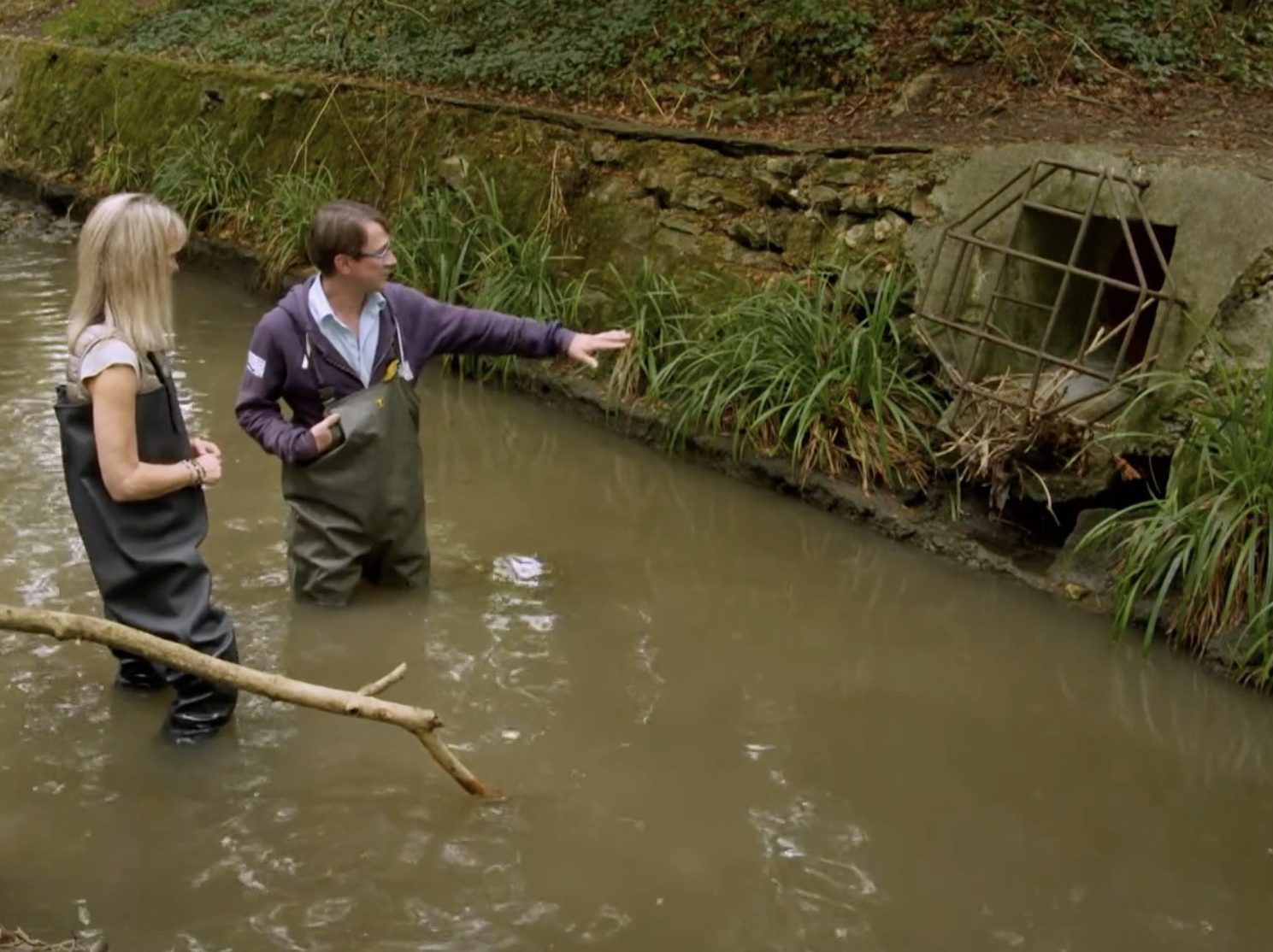
“The soft sediment underneath – I think you can imagine what it’s made up of,” remarked Dr Chris Gardner to TV presenter Michaela Strachan during Swimming in Sewage: Britain’s Water Scandal.
Our Head of Science and Partnerships was describing what lies at the bottom of the River Hogsmill right next to a Combined Sewer Overflow (CSO), an mechanism that sends raw sewage into rivers during heavy rainfall.
Aired on October 4, the documentary highlighted the effects of sewage being regularly pumped into our rivers, up and down the country. Rivers that were once clean to swim in are now full of what we flush down the loo, causing health issues for those unaware that raw sewage is being sent into them regularly, from these CSOs.
These pipes were designed to stop sewage backing up into homes during heavy rainfall, when sewage treatment works could not cope with the amount of waste and excess rainfall coming from urbanised environments. These single pipes combine waste water from our homes and businesses and surface water. They are supposed to be in operation sparingly. Last year, 15,000 CSOs across the country spilled water into our rivers for 2.5 million hours, the programme reported.
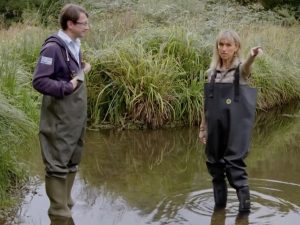
Chris had given Michaela a tour of a clean looking section of the Hogsmill. One of only 210 chalk streams in the world, its clear water – filtered through springs – provides a superb environment for aquatic life.
But as Chris took the presenter to the confluence of where the river meets the Green Lane stream on the River Hogsmill, the colour of the water suddenly became much more murky. The cameras showed dirt and sediment on the riverbed.
Dressed in waders, the pair moved to the site of a CSO, where Chris pointed to clear signs of it sending sewage into the river very recently – most likely the night before when it had rained.
Investment needed
Michaela, recoiling at the thought of raw sewage in this rare chalk stream which should be rich in minerals, asked what could be done?
Chris replied: “We need to invest in the sewage works infrastructure. For the past few decades we haven’t had the investment to keep up with the population growth. We also have climate change and more intense rainfalls.”
Many of the sewers have been around since Victorian times, so Michaela also wanted to know if it was possible to upgrade them?
“There certainly is a technical challenge,” replied Chris, “but we put people on the moon with [what is now] the computer power of a pocket calculator 50 years ago so, surely, we can upgrade our sewage works to the standards required.”
Our Chamber Mead wetlands project, which began in late August, is very close to where the filming took place. The wetlands will help to divert water from road run-off and urbanised pollution away from the Hogsmill. It will divert the Green Lanes stream – as seen in the documentary – into a series of new wetlands and project 200 metres of this chalk stream.
But what can you do to help protect rivers from sewage and pollution?
First, you can demand action from your Water Company. The programme’s airing could not have been more timely, coming just after water companies submitted their business plans for 2025-30 to Ofwat. Our recent blog looks at these plans and urges you to sign up to your water company’s online session, where you can question them about the details. These take place before the end of November. Are their timetables for addressing this urgent problem of sewage fast enough? How will they upgrade infrastructure? What nature-based solutions in urban areas are they planning to combat water, combined with sewage, rushing into our rivers all at once during heavy rainfall?
Second, you can sign the Rivers Trust’s Nature2030 campaign, asking all political parties to make five nature pledges in their manifestos ahead of a General Election, which many expect to take place next year. This asks that the “polluter pays” and for a Natural Nature Service, to protect our environment.
Third, you can back the Rivers Trust’s call to end the #ChemicalCocktail polluting all our rivers. This letter to the Government asks for several protections to be included for rivers in the Chemical Strategy.
- Swimming in Sewage: Britain’s Water Scandal was produced by Turquoise TV and is available on Channel 5’s catch-up facility.


